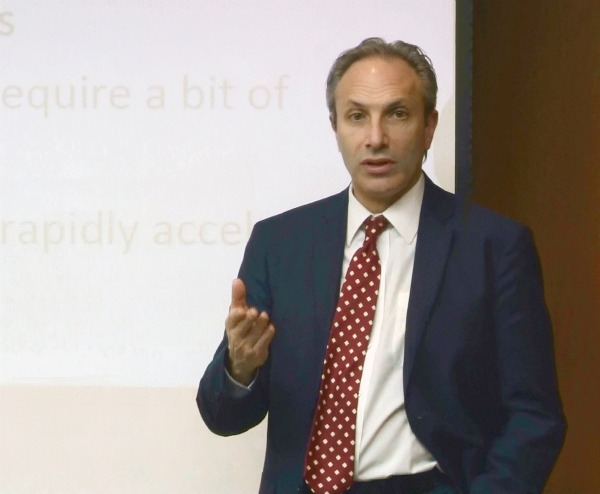IDS Director Professor Haddad Shares His List of Urgent Items on Top Research Agenda in Global Food and Nutrition Security
2012.03.22
On March 8, 2012, JICA-RI organized a small seminar on global food and nutrition security and invited Professor Lawrence Haddad, director of the Institute of Development Studies, in Sussex, U.K., to give a talk on this increasingly popular topic globally. Prof. Haddad is an economist who researches on issues related to poverty, food insecurity and malnutrition and is one of the major opinion leaders in the world on food security and development agendas.

Professor Lawrence Haddad
In his lecture, Prof. Haddad showcased a list of ten selected urgent items of food and nutrition research theme, which focused to address two major questions: “Why is under-nutrition stuck in South Asia?” and “What to do to get agriculture moving in sub-Saharan Africa?”
According to him, South Asia accounts for about 45% of the world’s malnourished children (partly due to the big population there) and their percentage in the population is much higher than that of sub-Saharan Africa. Prof. Haddad pointed out that the problem is this high level is not dropping despite the rapid economic growth countries like India are enjoying at the moment, and not many are aware of this fact. As for sub-Saharan Africa, he described it as one region that possesses the huge potential for agricultural success. With conditions like fertile soils and large areas of land available for cultivation, he called the current situation “being on the verge of an explosion of agricultural productivity and production in Africa,” and said this is important for Africa, but also for the rest of the world as the world needs to secure many more breadbaskets.
The urgent ten items, selected by Prof. Haddad, ranged from: “How can agriculture contribute more to under-nutrition reduction?” and “Will increased social accountability improve service delivery?”(for the question on South Asia); to “Large farms or small?” and “How seriously to take food price volatility?” (for sub-Saharan Africa). He illustrated each item with reasons why they should be researched now with his insights.
Prof. Haddad explained researchers in this field like him need to be strategic about how to spend available resources such as which regions to invest, which types of crops to plant, as once they are invested, it is rather difficult to change the path, and that is why he focused on these ten. The answers to the items are critical for policy and could help accelerate progress on eradication of extreme poverty and hunger, he concluded.
Lawrence Haddad
Director, The Institute of Development Studies, in Sussex, U.K

事業事前評価表(地球規模課題対応国際科学技術協力(SATREPS)).国際協力機構 地球環境部 . 防災第一チーム. 1.案件名.国 名: フィリピン共和国.

事業事前評価表(地球規模課題対応国際科学技術協力(SATREPS)).国際協力機構 地球環境部 . 防災第一チーム. 1.案件名.国 名: フィリピン共和国.

事業事前評価表(地球規模課題対応国際科学技術協力(SATREPS)).国際協力機構 地球環境部 . 防災第一チーム. 1.案件名.国 名: フィリピン共和国.

事業事前評価表(地球規模課題対応国際科学技術協力(SATREPS)).国際協力機構 地球環境部 . 防災第一チーム. 1.案件名.国 名: フィリピン共和国.

事業事前評価表(地球規模課題対応国際科学技術協力(SATREPS)).国際協力機構 地球環境部 . 防災第一チーム. 1.案件名.国 名: フィリピン共和国.
scroll